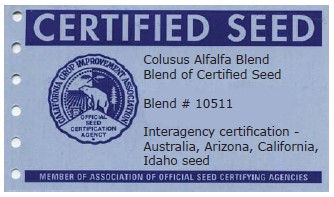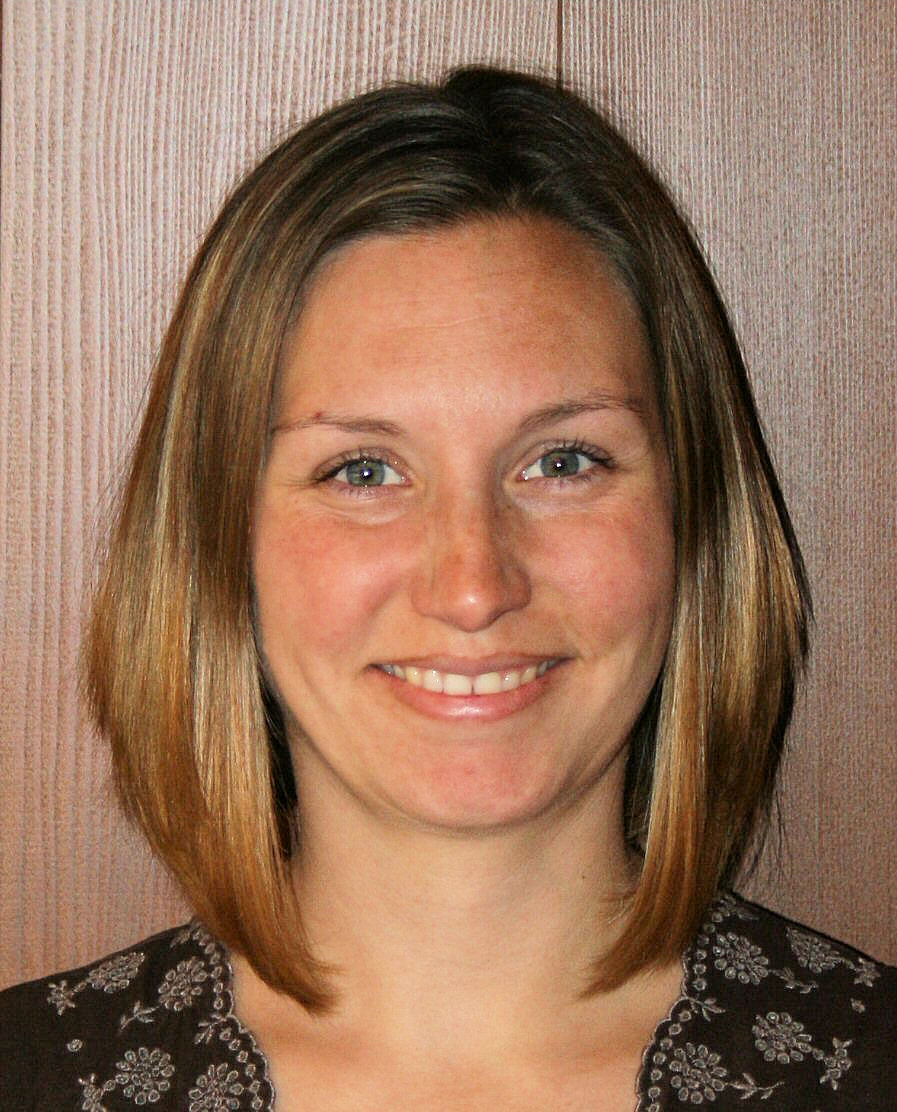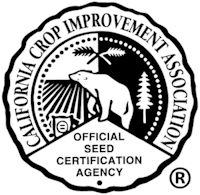Labeling requirements for blends
To update our current certification standards and comply with AOSCA and Federal Seed Act rules and regulations for blending lots of seed of different varieties of one crop type, the CCIA has adopted the following revised policies and procedures for conditioners planning on producing “Variety Blends”. All seed companies/conditioners are to be in full compliance with these revised rules by May 1st, 2010. All blends must meet the following criteria:

- All blend formulas shall be approved and recorded by the CCIA and shall not vary between lots and years.
- Only certified seed of each component variety shall be used in a seed blend.
- Permission to use a protected or proprietary variety must be obtained from the breeder or owner of that variety for each blend requested.
- Only CCIA approved conditioners that demonstrate the ability to blend/mix within specific tolerances will be permitted to do varietal blending or mixing.
- Each component of the blend must be 15% or greater of the total weight. This will limit the maximum number of components to 6.
- Each component must be present in increments of 5% (e.g. not 3% or 8%).
- There must be at least 15% difference in the amounts of each component from other similar blends.
Check the CCIA web site for detailed examples of blend percentages and sample tags.
Renewals due
Renewal Applications Due March 1st Applications for perennial field crops must be renewed annually. Login to your account and you will find a link to your renewals on the application grid page (near the link to begin a new application). For each renewal you must choose one of the following actions:
- Renew application - the production field will be used for seed production in the 2010 crop year.
- No crop - a seed crop will not be produced in this crop year, but the field should remain in the certification program for future years.
- Cancel - field is cancelled and removed from the certification program.
You must take action on all your existing perennial applications by March 1st. If no action is taken by March 1st, the application will be canceled.
Scholarships awarded
CCIA provides scholarships to students attending the major agricultural universities in California. These students must indicate an active interest and participation in the seed industry, crop improvement, crop science clubs, seed packaging, seed and plant judging contests and/or activities related to seed production. Each university sets their own due dates and application specifics. For more information please contact the College or Department at each school or Robert Stewart at CCIA, 530-752-9826 (rfstewart@ucdavis.edu).
This past year $1500 scholarships were awarded to:
Sarah Risorto, Cal Poly, Pomona - Sarah is a senior Agronomy major, an active member of Los Rancheros, American Society of Agronomy sponsored student club and the Crops and Horticulture Judging Team. She is currently involved in three student enterprise crop projects. Sarah has been selected to attend the Hispanic Association of Colleges and Universities Annual Leadership Conference. Off campus, Sarah is a laboratory intern at West Valley Mosquito and Vector Control.
Michael Brian, Cal Poly, San Luis Obispo - Michael is a senior, majoring in Crop Science and minoring in Plant Protection Science. He has been enrolled in the Cal Poly Organic Farm enterprise project and has summer interned with Wilbur Ellis Company in the Agribusiness Division. He has served on the Crop Science Student Fee Committee.
Brian Corcoran, Chico State University - Brian is a Crop Science Major. He transferred from Butte Community College after earning Associate of Science Degrees in Horticulture and Agriculture Business. His interests include Seed Production, Entomology, and Ecology. Brian recently attended the California Seed Tour. Brain has served in Student Government and Plant Science Clubs as an officer and currently volunteers at the Horticultural Unit at the CSU Chico Farm.
Recertification
Spring is fast approaching and most applicants are finalizing decisions on what seed stock to use for seed production during the forthcoming season. During this time of decision-making we would like to note that requests to CCIA for recertification (certified to certified) have been on the increase lately. CCIA does not encourage recertification unless a genuine emergency has occurred. However, during the recent past we have received some requests for recertification where no Foundation or Registered class seed was produced previously. These recertification requests are indicative of a lack of proper forecasting and planning and do not constitute emergencies. A sudden unexpected increase in certified seed demand may not constitute a justification for an emergency to recertify seed especially where there is no apparent effort to produce parent seed. AOSCA states that ‘Emergency requests should not be based on an individual’s or company’s failure to adequately plan for production or based upon fields failing to meet certification standards.’
We would like to remind applicants that the production of an additional generation of the Certified class may only be permitted on a one year basis, when the certifying agency declares an emergency prior to the planting season, stating that the Foundation and Registered seed supplies are not adequate to plant the needed certified acreage of a particular variety. Applicants are encouraged to consult with variety maintainers to plan for their pedigree production accordingly because lack thereof will not justify a request for recertification. In the event of an emergency, the applicant shall state the factors that led to a lack of the parent seed to constitute an emergency for recertification and shall request CCIA to consider emergency declaration. In making this declaration CCIA shall consult with other AOSCA agencies to determine the general lack of certified seed for the variety. These consultations shall also be with the certification agency with jurisdiction for the area where the recertified seed will be sold. Recertification may only be allowed to replace the originally planted production for the original producer. CCIA will continue to reserve the right to declare an emergency and grant recertification even after agency consultations. Please also note that seed produced under this declaration is not eligible for further certification.
Update organization information
We recommend an annual check of your company contact information that is stored at the CCIA web site. This information is vital for communication between your company and CCIA. Use the “Update Company Profile” link on the left side of the CCIA web site. Login using your company ID number and password. Call Kitty Schlosser at 530-752-6979 if you have misplaced this information. Update company contact information if needed. The email address listed here is the one that will receive all important information from CCIA including notification that Field Inspection Reports and Seed Inspection Reports have been processed. Check the list of employees that can login, submit and/or print applications and requests for seed certifications. Delete any employees that should no longer have this privilege. It is your company’s responsibility to add and remove permissions in order to maintain the security of your company records.
Staff Focus - Nicole Hostert
 We are pleased to welcome Nicole Hostert to CCIA as part of the field services staff. Nicole was born and raised in Salinas, California and moved to Davis in 1998 to attend UC Davis. During the course of her undergraduate career Nicole worked for Pioneer Hi-Bred International in Woodland as a research assistant in the maize drought program. In 2003 she graduated with a B.S. in Crop Science and Management and then continued her education by receiving a M.S. in Integrated Pest Management (with an emphasis in Plant Pathology) under the direction of Dr. Mike Davis and Dr. Bob Webster. She was hired again by Pioneer Hi-Bred to work as their sunflower parent seed leader and then also had the pleasure of working for Seminis Vegetable Seeds as a Foundation Seed Specialist for melons and short day onions. Nicole maintains her PCA license and is a member of CAPCA. She lives in Woodland with her husband Brian, who is the testing and operations manager for Monsanto’s maize drought breeding program, and their two year old daughter Madison. They are expecting another baby in mid March.
We are pleased to welcome Nicole Hostert to CCIA as part of the field services staff. Nicole was born and raised in Salinas, California and moved to Davis in 1998 to attend UC Davis. During the course of her undergraduate career Nicole worked for Pioneer Hi-Bred International in Woodland as a research assistant in the maize drought program. In 2003 she graduated with a B.S. in Crop Science and Management and then continued her education by receiving a M.S. in Integrated Pest Management (with an emphasis in Plant Pathology) under the direction of Dr. Mike Davis and Dr. Bob Webster. She was hired again by Pioneer Hi-Bred to work as their sunflower parent seed leader and then also had the pleasure of working for Seminis Vegetable Seeds as a Foundation Seed Specialist for melons and short day onions. Nicole maintains her PCA license and is a member of CAPCA. She lives in Woodland with her husband Brian, who is the testing and operations manager for Monsanto’s maize drought breeding program, and their two year old daughter Madison. They are expecting another baby in mid March.
